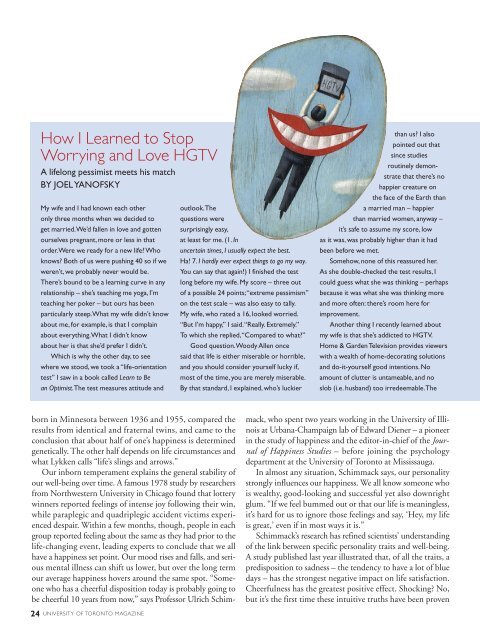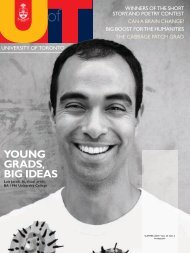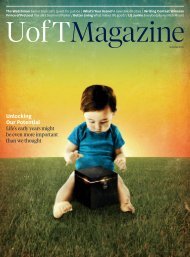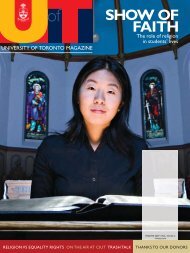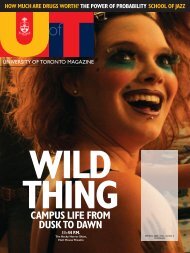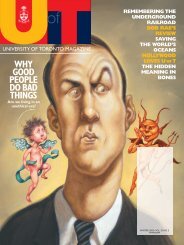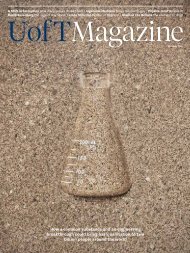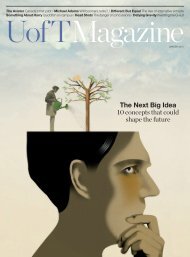20-26 3/2/05 4:54 AM Page 24How I Learned to StopWorrying and Love HGTVA lifelong pessimist meets his matchBY JOEL YANOFSKYMy wife and I had known each otheronly three months when we decided toget married.We’d fallen in love and gottenourselves pregnant, more or less in thatorder.Were we ready for a new life? Whoknows? Both <strong>of</strong> us were pushing 40 so if weweren’t, we probably never would be.There’s bound to be a learning curve in anyrelationship – she’s teaching me yoga, I’mteaching her poker – but ours has beenparticularly steep.What my wife didn’t knowabout me, for example, is that I complainabout everything.What I didn’t knowabout her is that she’d prefer I didn’t.Which is why the other day, to seewhere we stood, we took a “life-orientationtest” I saw in a book called Learn to Bean Optimist.The test measures attitude andoutlook.Thequestions weresurprisingly easy,at least for me. (1. Inuncertain times, I usually expect the best.Ha! 7. I hardly ever expect things to go my way.You can say that again!) I finished the testlong before my wife. My score – three out<strong>of</strong> a possible 24 points;“extreme pessimism”on the test scale – was also easy to tally.My wife, who rated a 16, looked worried.“But I’m happy,” I said.“Really. Extremely.”To which she replied,“Compared to what?”Good question.Woody Allen oncesaid that life is either miserable or horrible,and you should consider yourself lucky if,most <strong>of</strong> the time, you are merely miserable.By that standard, I explained, who’s luckierthan us? I alsopointed out thatsince studiesroutinely demonstratethat there’s nohappier creature onthe face <strong>of</strong> the Earth thana married man – happierthan married women, anyway –it’s safe to assume my score, lowas it was, was probably higher than it hadbeen before we met.Somehow, none <strong>of</strong> this reassured her.As she double-checked the test results, Icould guess what she was thinking – perhapsbecause it was what she was thinking moreand more <strong>of</strong>ten: there’s room here forimprovement.Another thing I recently learned aboutmy wife is that she’s addicted to HGTV.Home & Garden Television provides viewerswith a wealth <strong>of</strong> home-decorating solutionsand do-it-yourself good intentions. Noamount <strong>of</strong> clutter is untameable, and noslob (i.e. husband) too irredeemable.Theborn in Minnesota between 1936 and 1955, compared theresults from identical and fraternal twins, and came to theconclusion that about half <strong>of</strong> one’s happiness is determinedgenetically. The other half depends on life circumstances andwhat Lykken calls “life’s slings and arrows.”Our inborn temperament explains the general stability <strong>of</strong>our well-being over time. A famous 1978 study by researchersfrom Northwestern <strong>University</strong> in Chicago found that lotterywinners reported feelings <strong>of</strong> intense joy following their win,while paraplegic and quadriplegic accident victims experienceddespair. Within a few months, though, people in eachgroup reported feeling about the same as they had prior to thelife-changing event, leading experts to conclude that we allhave a happiness set point. Our mood rises and falls, and seriousmental illness can shift us lower, but over the long termour average happiness hovers around the same spot. “Someonewho has a cheerful disposition today is probably going tobe cheerful 10 years from now,” says Pr<strong>of</strong>essor Ulrich Schimmack,who spent two years working in the <strong>University</strong> <strong>of</strong> Illinoisat Urbana-Champaign lab <strong>of</strong> Edward Diener – a pioneerin the study <strong>of</strong> happiness and the editor-in-chief <strong>of</strong> the Journal<strong>of</strong> Happiness Studies – before joining the psychologydepartment at the <strong>University</strong> <strong>of</strong> <strong>Toronto</strong> at Mississauga.In almost any situation, Schimmack says, our personalitystrongly influences our happiness. We all know someone whois wealthy, good-looking and successful yet also downrightglum. “If we feel bummed out or that our life is meaningless,it’s hard for us to ignore those feelings and say, ‘Hey, my lifeis great,’ even if in most ways it is.”Schimmack’s research has refined scientists’ understanding<strong>of</strong> the link between specific personality traits and well-being.A study published last year illustrated that, <strong>of</strong> all the traits, apredisposition to sadness – the tendency to have a lot <strong>of</strong> bluedays – has the strongest negative impact on life satisfaction.Cheerfulness has the greatest positive effect. Shocking? No,but it’s the first time these intuitive truths have been proven24 UNIVERSITY OF TORONTO MAGAZINE
20-26 3/2/05 4:55 AM Page 25‘‘When my wife and I are watchingDebbie Travis’ Facelift, I’ll notice she’s eyeing me the wayshe used to eye our gloomy living room decor’’premise <strong>of</strong> the channel, which featuresredesign and makeover programs 24/7, isthat by improving your surroundings you willinvariably improve your outlook, yourattitude and your potential for happiness.I complain to my wife about HGTV,but, frankly, I enjoy it. I like the perky hostsand their earnest handyman sidekicks talkingabout “wallpaper making a comeback.”Or saying things like,“Eggshell is the newblack.” Only now, when my wife and I arewatching Debbie Travis’ Facelift or Rooms ThatRock, I’ll notice she’s eyeing me the wayshe used to eye our gloomy living roomdecor. Her focus has shifted from ourhome’s interior to mine.In an episode <strong>of</strong> The Simpsons, Margeshares some advice on the opposite sex withher daughter, who has become infatuatedwith a pint-sized thug.“Most women will tellyou you’re a fool to think you can change aman,” she says to Lisa,“but those womenare quitters.” My wife’s no quitter.And it doesn’t help that there’s nowscientific evidence to support her decisionto make me her new renovation project.Martin Seligman, the author <strong>of</strong> AuthenticHappiness and a former president <strong>of</strong> theAmerican Psychological Association, studiedoptimism for 25 years and concluded that“optimistic people got depressed at half therate <strong>of</strong> pessimistic people,” and that theyalso “had better, feistier immune systems,and probably lived longer than pessimisticpeople.” They also tend to be betterstudents, salespeople, athletes, parents and,it goes without saying, husbands.So it’s no wonder that upbeat is in andthat self-esteem couldn’t be more highlyesteemed. Feeling good about the world andyourself is its own reward, <strong>of</strong> course, butit’s also as trendy these days as pilates andSUVs.“Happiness is the new black,” mywife announced the other day.According to Seligman, himself a recentlyreformed grouch, the goal for psychologistsand psychiatrists has changed.They usedto worry mainly about making miserablepeople less miserable; now they concentrateon making happy people happier.“My aimis that psychology and maybe psychiatrywill increase the tonnage <strong>of</strong> happiness in theworld,” Seligman said in a recent interview.He and others in the field called positivepsychology are hard at work creating“interventions that reliably changepessimists into optimists.”In other words, as my wife alsoannounced recently,“Resistance is futile.”For some people, the Dalai Lama orDonald Trump, let’s say, happiness comesnaturally; others, like me, have to havetons <strong>of</strong> it thrust upon them. Still, I’m notcomplaining anymore. In fact I’m countingmy blessings – along with learning toenjoy yoga, an exercise highly recommendedin Learn to Be an Optimist. I know I’m luckyto have a family I love and a wife whocares about me enough to try to make meinto a brand new person. But am I forgettingsomething? Yes, <strong>of</strong> course, access, roundthe clock, to HGTV.Joel Yan<strong>of</strong>sky is a Montreal writer and the author<strong>of</strong> Mordecai & Me:An Appreciation <strong>of</strong> a Kind.scientifically. Schimmack also found that, contrary to what wemight expect, sociability plays only a minor role in increasingour sense <strong>of</strong> fulfilment, and anxiety doesn’t diminish it. “A lack<strong>of</strong> meaning is more detrimental to life satisfaction than stressand worries,” he says.Since we can’t trade in our gloomy genes, this may all soundgrim. Yet in the realm <strong>of</strong> happiness, personality is not destiny.We have the capacity to enhance our well-being by striving forthings that will make our lives more satisfying, says Schimmack.The problem is that we generally don’t know what willmake us happy or unhappy. Joy is rarely as intense or as longlastingas we imagine it will be, and the same is true for despair.This leads us to make poor choices in our quest to be happy.So Schimmack’s ultimate goal is to identify, through scientifictesting, the personal and social factors that truly do contributeto our sense <strong>of</strong> well-being.What do people say when they’re asked what makes themhappy? Family and friends tend to rank high, as do religion,career and health. But studies have yielded conflicting results,particularly about how much marriage and faith contributeto happiness. Although a 2000 study by Diener <strong>of</strong> more than59,000 people in 42 countries concluded that there is a positivecorrelation between marriage and life satisfaction acrosscultures, more recent studies have challenged this idea. In2003, Richard Lucas <strong>of</strong> Michigan State <strong>University</strong> publishedresearch showing that people report being happier only at thebeginning <strong>of</strong> a marriage; after five years they tend to returnto their previous level <strong>of</strong> happiness. As for religion, studieshave demonstrated a link between religiosity and happiness,though researchers say the social-support and communityaspects <strong>of</strong> attending religious services are probably moreimportant than belief in a higher being.In an experiment involving mostly female universitystudents, Schimmack showed that feeling satisfied in areas<strong>of</strong> our lives that we personally value can strongly contributeto happiness. “Progress toward a goal in a life domain that youSPRING 2005 25


